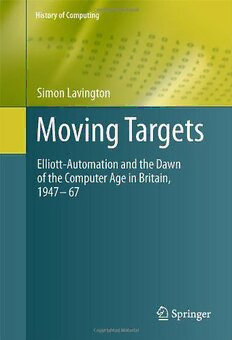
Moving Targets: Elliott-Automation and the Dawn of the Computer Age in Britain, 1947 – 67 PDF
733 Pages·2011·14.943 MB·English
Most books are stored in the elastic cloud where traffic is expensive. For this reason, we have a limit on daily download.
Preview Moving Targets: Elliott-Automation and the Dawn of the Computer Age in Britain, 1947 – 67
Description:
The Elliott-Automation company was an active participant in the birth of the information agein Britain. By 1961, the company was supplying 50% of the digital computers delivered to UK customers in that year. Yet by the end of that decade, Elliott-Automation had effectively disappeared in a flurry of takeovers, leaving little apparent trace of the technical excellence that had once characterised the name Elliott.Moving Targetscharts the gradual take-up of information technology in Britain, as seen through the eyes of one innovative company. The book examines how the dawn of the digital computer age in Britain took place at various times for different applications, from early government-sponsored work on secret defence projects, to the growth of the market for Elliott computers for civil applications.Topics and features:Charts the establishment of Elliott’s Borehamwood Research Laboratories in 1946, and the roles played by John Coales and Leon Bagrit in reviving an ailing companyExamines early Elliott digital computers designed for classified military applications and for GCHQ, such as the Elliott 152, 153 and OEDIPUSDescribes the analogue computers developed by Elliott-Automation, including the giant TRIDACReviews the development of the first commercial Elliott computers, the growth of applications in industrial automation, and the competition offered by rival manufacturers in BritainIncludes a history of airborne computers up to 1988, written by a former director of Elliott Flight AutomationDiscusses the evolution of computer architectures and systems software for the Elliott 800, 900 and 4100 series computersInvestigates the mergers, takeovers and eventual closure of the Borehamwood laboratories, and the demise of Elliott-Automation and its successors, ICL and GECThis unique text will be of great interest to historians of technology and business, and will also appeal to the general reader curious about the emergence of digital computing in Britain and the work of the previously unsung computer pioneers of the Elliott-Automation laboratories at Borehamwood.Simon Lavington is Emeritus Professor of Computer Science at the University of Essex. Among his many publications is the book Early British Computers.
See more
The list of books you might like
Most books are stored in the elastic cloud where traffic is expensive. For this reason, we have a limit on daily download.
